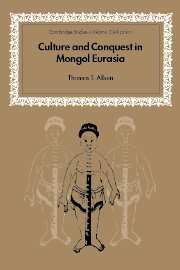Book contents
- Frontmatter
- Contents
- Preface
- Note on transliteration
- Abbreviations
- PART I BACKGROUND
- PART II POLITICAL–ECONOMIC RELATIONS
- 3 Formation of the Il-qans, 1251–1265
- 4 Grand Qans and Il-qans, 1265–1295
- 5 Continuity and change under Ghazan, 1295–1304
- 6 Sulṭāns and Grand Qans, 1304–1335
- 7 Economic ties
- 8 Overview of the relationship
- PART III INTERMEDIARIES
- PART IV CULTURAL EXCHANGE
- PART V ANALYSIS AND CONCLUSIONS
- Bibliography
- Index
- Other titles in the series
7 - Economic ties
Published online by Cambridge University Press: 04 September 2009
- Frontmatter
- Contents
- Preface
- Note on transliteration
- Abbreviations
- PART I BACKGROUND
- PART II POLITICAL–ECONOMIC RELATIONS
- 3 Formation of the Il-qans, 1251–1265
- 4 Grand Qans and Il-qans, 1265–1295
- 5 Continuity and change under Ghazan, 1295–1304
- 6 Sulṭāns and Grand Qans, 1304–1335
- 7 Economic ties
- 8 Overview of the relationship
- PART III INTERMEDIARIES
- PART IV CULTURAL EXCHANGE
- PART V ANALYSIS AND CONCLUSIONS
- Bibliography
- Index
- Other titles in the series
Summary
To obtain a full and balanced picture of the nature and intensity of the relationship between the two courts, we need to explore briefly their economic ties. Again, this does not pretend to be exhaustive (or economic history); rather, the intention in this chapter is to supply additional context for their cultural exchanges.
During the reign of Abaqa, a certain Yaʿqub, described by Bar Hebraeus as “a great merchant and a Christian,” died in Khurāsān while returning from the court of Qubilai. He was accompanied on his travels, we are further informed, by Abaqa's ambassador, an Uighur named Yashmut. Such overland trading ventures, conducted in association with official diplomatic missions, must have been a common occurrence whenever land travel was safe. As the thirteenth century wore on, however, it seems likely that disturbances and military confrontation in central Asia increasingly forced merchants and envoys onto alternative routes. Consequently, the Indian Ocean assumed an important, if not central, place in the economic relations between China and Iran. In any event, we have much fuller information on this seaborne commercial traffic.
The Indian Ocean trade, of course, long predated the Mongols and was in no sense created or controlled by them. This network of exchange reached from the ports of South China, such as Zaiton (Ch'üan-chou), to Alexandria on the shores of the Mediterranean.
- Type
- Chapter
- Information
- Culture and Conquest in Mongol Eurasia , pp. 41 - 50Publisher: Cambridge University PressPrint publication year: 2001



